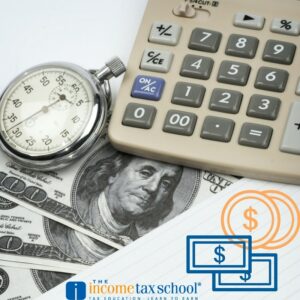What are your fees? How do you charge and do you make your schedule of charges public? These are all  questions you should be asking if you are a new tax business owner. Here are some things to think about.
questions you should be asking if you are a new tax business owner. Here are some things to think about.
Charging by the Form vs. by the Hour
There are two different ways you can charge customers for tax preparation services: by the form or by the hour. Our sister company, Peoples Tax, charges by the form because it results in more equitable, consistent and fair pricing. This is because we employ multiple tax preparers who have different levels of knowledge and productivity. Charging by the form eliminates the need to track hourly billing and makes the billing process a little easier.
If you are thinking about charging by the hour, consider the following: is it yourself or do you employ multiple preparers with different levels of experience? For many mass market and national firms, charging by the hour would mean less knowledgeable and less productive preparers would be overcharging and more knowledgeable and productive preparers might be undercharging. If they charged by the hour, they would need to set different hourly rates for tax preparers based on their expertise and productivity (which would be subjective), and would require periodic adjustments in billing rates. If you run a larger tax firm that employs multiple preparers, charging by the form eliminates the subjectivity and hassles required by hourly billing.
If you are a sole practitioner, an hourly billing rate would not be an issue. One benefit to charging by the hour is that it makes up for tax situations that take a considerable amount of time, or for clients who fail to give you all of the information you need and thus taking up more of your time.
Determining Rates
Most tax practitioners or other professionals who prepare taxes for a living don’t make their schedule of charges or hourly rates public. If you are trying to determine what your fees should be, start by knowing what the average cost of tax preparation fees are. The NSA did a survey recently on the average charges for various types of tax forms. Here’s the list to give you a base line.
- The average cost for preparing a 1040 (Schedule C) Tax Form is $218
- The average cost for preparing an 1120 Tax Form (C corporation) is $806
- The average cost for preparing an 1120S Tax Form (S corporation) is $761
- The average cost for preparing a 1065 Tax Form (partnership) is $590
- The average cost for preparing a 1041 Tax Form (fiduciary) is $497
- The average cost for preparing a 990 Tax Form (tax-exempt organization) is $667
- The average cost for preparing a 940 Tax Form (Federal unemployment) is $63
- The average cost for preparing a Schedule D (capital gains and losses) is $142
- The average cost for preparing a Schedule E (supplemental income and loss) is $165
- The average cost for preparing a Schedule F (farming) is $196
Once you get an idea of what the average is, you need to consider your level of education. Some tax practitioners charge higher based on their credentials such as EA, CPA, attorney, and now AFTR, as well as other credentials including those awarded by The Income Tax School (Chartered Tax Advisor, Chartered Tax Consultant, and Chartered Tax Professional). Take into consideration your credentials and experience before you set your fees.
Should You Make Your Fees Public?
It’s still hard for the average customer to know what they might expect to pay unless you list all of your prices. Even still, the customer would need to know all of the forms they would need in order to add them up to get the correct price. If you charged by the hour, the customer would need to know the average amount of time it would take for each form, and all of the forms needed. So While it would be convenient to your customer to list your prices, it would likely not be helpful.
Price Quotes
An alternative to listing your fees is to offer a free estimate or price quote. The challenge with this is making sure the customer tells you everything they have for their tax return. When people leave things out (and trust us they will), the quoted fee may end up being larger. For this reason, a price quote should always be accompanied by a qualification statement such as “this quote is based on the information you have provided to me. If we become aware of something else during the interview that would require an additional schedule or statement, an additional fee could be necessary.”
Determining your fees is important – you want to make sure you are offering value, that you are in line with your competitors, and that you are not undervaluing yourself. Want to know more about building a tax business? Our Tax Practice Management Manuals have everything you need to know.
